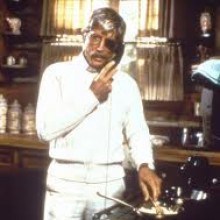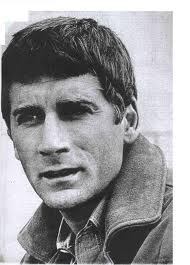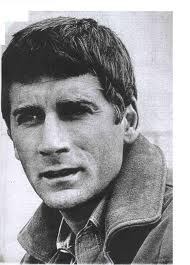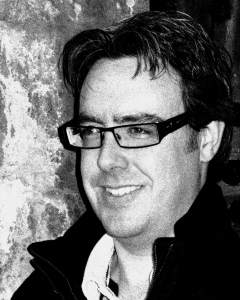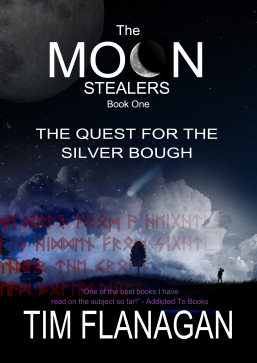Alex Cord's Blog, page 2
May 15, 2014
Jana Petken And The Art of Writing Historical Fiction…
About This Interview
Jana Petken is a talented writer who currently resides in Spain. She chose a hard genre when she became a writer and it’s only fair that we give her a great interview. What makes her stand above other writers? That’s an easy one to answer– she writes as though she is watching a movie– her words are moving pictures. I think you will love her interview and her book… Enjoy!
The Guardian of Secrets
A historical family saga spanning four generations, from 1912, Kent, England, to Spain and its 1936–39 civil war. Celia and Ernesto’s two sons march under opposing banners, whilst their daughters take different paths, one to the Catholic Church and the other to the battlefields, and in the shadow of war, an evil ghost from the past watches and waits for an opportunity to destroy the entire family. In exile, Celia and Ernesto can only wait and pray for their children and their safe return home..

How did you get interested in writing this particular genre and what does a would-be writer in your category need to know?
History has always held my interest. I love the subject and the wonderful opportunities that history can bring to the imagination. This is not a genre that I chose; I believe it chose me. To be able to read about kings, queens, wars, politicians, villains and heroes throughout history, is a wonderful experience.
I can only give this advice to, would be, historical writers: When you tell a story, make your backdrop real. Take the time to investigate and research the facts surrounding your characters, such as locations, names, dates or events.
What kind of research did you do and where do you begin your research?
The research for, The Guardian of Secrets, was a long, painstaking job. I had no internet and spent my time in libraries, buying reference books, watching documentaries, visiting battle sites in Spain, studying the lives of nuns, interviewing Civil War survivors, and a couple of soldiers from opposing sides – I said painstaking but it was a wonderful experience.
I still prefer researching the old fashioned way, rather than using Google or Wikipedia. They are both great tools but they don’t bring me the same sense of “Learning” as reference books.
What’s a typical writing day like for you? When and where do you write? Do you set a daily writing goal?
I walk my dog. I write early in the morning, I drink a lot of tea, I never set myself goals and I have been known to fall asleep in front of the computer in mid sentence. I work for as long as I am still able to focus. When my mind goes blank and the words start jumping, I go out and clear my mind with a coffee and a chat with friends.
What is the hardest part of writing and how do you get past the difficulties involved?
The hardest part for me is probably starting a new project. The first page, the first sentence, and the first chapter can be challenging, especially for me, because I don’t outline the story –I tend to hope and pray that inspiration will guide me through unknown territory and lead me to my destination.
What’s the best thing about being an author?
The best thing about being an author, for me, is that I meet such interesting people throughout history, even though they never actually existed but instead, grew from my own mind. I love the way writing can bring an idea to life; a person that is loved or hated with a passion. I love to hear my readers tell me how much they cried or laughed. I love to be able to shock and get away with it – fingers crossed!
What’s the worst thing about being an author and does the good outweigh the bad?
Writing can consume you. It can make everything else fade into insignificance. Housework, shopping for groceries, and socialising can fall by the wayside. Then there are the sleepless nights, thinking about what a character is going to do next, and of course, daily attempts to stand out somehow, somewhere, in order to advance in this profession.
Being an author, especially a debut author, is an uphill struggle and can be frustrating at times. But the passion and joy of creating words far outweighs any negative aspects.
Do writers get better with practice? Or is writing just a talent you have from day one?
I believe that both apply. Writing is a talent, a passion, and a creative gift – Having said that, I also believe that the learning process is perpetually on- going. Writing demands hard work, time, and effort. Today, anyone can publish a finished manuscript. It is open season for writers. I ask myself: What defines a good writer? The book industry may say that it is an author with a traditional publishing deal. I disagree. A good writer is someone who has written a good, readable, and enjoyable novel.
What advice would you give to aspiring writers?
I don’t think I can give advice when I am forever seeking it. I’m not giving up, so I guess I would say to others: Don’t give up.
Do you have any favorite authors or favorite books and how did your favorite books change the way you wrote?
I don’t read a lot. I prefer visual entertainment, such as movies, series, and documentaries. I read a lot of biographies, mostly historical. My favourite author is Ken Follett. I have read all his books and think it only fair that he reads mine now, don’t you think?
How important is grammar to the writer? Should content come first or perfect grammar?
Content should come first. The mind should be free to write – But grammar is very important and I, personally, would never submit a book without first employing a reputable editor to make sure that nuances like grammar, punctuation, and format are of the highest standard possible.
Did you spend much time refreshing your knowledge of grammar and writing rules?
No, and this is probably why it took me so long to write, The Guardian of Secrets. I learned the hard way. I was a novice and ignorant, if truth be told. I believe that after the fourth or fifth draft, I saw the error of my ways, and corrected them. But, as I mentioned earlier, I don’t believe we ever stop learning.
Should writers worry about bad reviews? Are reviews really that important?
I can’t speak for anyone else. Some writers are more sensitive than others. Bad reviews can be upsetting. It feels as though someone is insulting your child. There are also people who enjoy making mischief and will give bad ratings and reviews without having read a book – Please allow me to tell you a personal story about this issue, one day.
Reviews are very important, especially honest ones. They are a gift, much appreciated, and necessary for any writer; established or relatively unknown.
Is a great story or a great cover more important?
The cover should catch the reader’s eye. Covers are valuable assets but the story is the most important element- a cover can always be changed.
Do you believe there is any “one” set genre or can books be in multiple genres?
Writers can write in various genres. Some writers are defined by their, genre, whilst others are more open to change. It depends how comfortable the writer feels and how interested he or she is in a particular genre.
At this moment in time, I’m enjoying writing, historical fiction. I have so many ideas for new stories, still trapped in my imagination waiting to get out, so I don’t see me switching genres in the foreseeable future – although I am writing a story, set in the future, which I dabble with every now and again, just for fun.
Are intelligent reads better reads?
I think that all depends on what the reader is looking for. There are so many different genres now. I can’t keep up. I like a book that entertains me but it also has to teach me something.
How do you write dialogue? Do you act it out as you write it? Is it based on the way you would say something?
Laughs – As a child, I dreamed of being an actress. I have achieved this ambition through writing. I feel sorry for my neighbours I really do because when I go into character, I really go for it. I think that if you say something and it doesn’t sound believable to your ears, it’s not going to be believable on paper. Take, Joseph Dobbs from, The Guardian of Secrets? He is the most despicable man, in every way, yet he’s my favourite character in the book – what can I say, I loved playing him. Does that make me a bad person?
Are your characters ever based on you?
No, not yet.
How do you know if something is right for your book? Do you rewrite until you get the perfect mix?
Sometimes a chapter just falls into place. Other times it looks clumsy and unrealistic, so yes, I usually take it down to the bones and rewrite. If it still looks bad I scrub it altogether because it means it’s not meant to be there. Other authors may disagree but that’s how I feel about it.
How does it feel to hold a finished manuscript in your hand?
It feels as though you have just created a story, which hopefully will have an impact on a person’s life, in some way or another. It’s a wonderful but scary moment; like setting a bird free and hoping it will survive and flourish in that big Amazon jungle.
Get your copy of Jana’s fantastic historical romance today from Amazon!


PRESS RELEASE: “Airwolf” Star Alex Cord To Pen Long-Anticipated Memoir
For Immediate Release
15/05/14
“Airwolf” Star Alex Cord Says He’ll Write The Story of His Life
Long Awaited Memoir From Movie Star and Author, Cord, To Be Released 2014
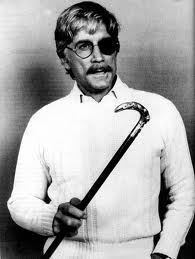
Prague— 15/05/14 — “Airwolf” star Alex Cord announced that he will write his memoir this year. Fans of Cord’s acting will learn about a life that most people wouldn’t even dare to dream. “I was born with a wild imagination, a conviction of the power of dreams, and a life-long passionate love for horses. Almost all of my dreams and fantasies have come true.” He says that when he thinks back on the bizarre events that have become his life, he sometimes wonders if they really did occur or did he just dream them.
He’ll reveal behind the scenes glimpses of working on “Airwolf” with Jan Michael Vincent and Ernest Borgnine. He’ll take you on the journey from being an uneducated bricklayer in New York to playing polo with Prince Charles and becoming Kirk Douglas’s brother in “The Brotherhood.”
Many of Cord’s fans have been asking for this memoir. Cord has written three novels already, and all have been well-received. “Writing about my life will cause me to think, to examine the enormous changes that have taken place in my heart and mind as I’ve ridden the wind. I am now a totally different man than I was years ago. I’d like to know more about how that came to be and share it with those who might find value in it.”
Alex Cord’s first experience as an actor was on stage in college, where he studied English Literature. “All the pretty girls were in the Dramatic Arts Department.” He spent a summer at the American Shakespeare Festival in Stratford, Connecticut. He soon found himself in leading stage roles and later as a leading man in the movie industry, working and developing friendships with icons he had idolized while growing up. His films included the groundbreaking “Synanon,” the movie adaptation of Harold Robbins’ “Stiletto” and the lead in the much lauded 1966 remake of John Ford’s “Stagecoach,” playing the role that made John Wayne a star, The Ringo Kid.
In the 1970s, Cord penned his first novel “Sandsong.” He starred in countless TV shows and several films. It was, however, with the ’80s TV show “Airwolf” that Cord became most recognizable as the white-suited “Archangel.”
Alex Cord kept his visibility high until his retirement on a Texas ranch, with roles in many films and TV shows.
This highly-anticipated memoir will, for the first time, allow readers into the real stories behind “Airwolf,” Hollywood, the movie industry, and a complex, ever evolving Renaissance man.
For more information or to book an interview with Alex:
Nick Wale
+44-7733191450
Nick@nickwale.org


May 14, 2014
Alex Cord Grilled By The Brits
Many of you will recognize Alex Cord as the character Archangel from the TV series Airwolf, alongside Ernest Borgnine and Jan-Michael Vincent. Cord has also appeared in other hit TV series including: Mission Impossible, Simon and Simon, Jake and the Fatman and Murder She Wrote. As well as being an accomplished stage performer, Cord has appeared in over 30 movies alongside Kirk Douglas, Richard Attenborough, and Harrison Ford.
When you make someone happy with something as simple as a smile, your heart will fill with joy.
- Alex Cord


Alex Cord AKA Alex Viespi? Where Did “Viespi” Come From?
The meaning of Viespe is? It’s from the word viespe wasp.
What is the origin of name Viespe? Probably Romania or Italy.
Anagrams: Pevesi Iesepv Sepeiv Evsiep Sievpe Sveipe
Common Misspellings: Vyespe Wiespe Viepe Viespea Veispe Viesep Viepse
Alex changed his name from Viespi to Cord to escape having to spell “Viespi” out to every person who asked his second name. If you meet Alex ask him to tell you the rhyme he used to spell out his second name. Cord came from a friend. It is a common misconception that “Cord” came from the “Carpetbaggers” character, Cord.


May 13, 2014
Alex Cord On “Brian’s Drive-In Theatre”
Born Alexander Viespi Jr. May 3, 1933, in New York, actor Alex Cord came down with polio at age 12, leaving him crippled and with a left leg two inches shorter than his right leg. Cord’s parents sent him to a ranch in Wyoming to recover and build up strength in his left leg. During his recovery, Cord developed an affinity for riding horses and, by age 16, he was competing in rodeo contests, winning so much prize money that he dropped out of school to compete full time. Five years later, he gave up the rodeo after a serious injury caused by a bull that gored Cord in the stomach with its horn and ruptured his spleen. During an eight-month recuperation period, Cord settled on acting as a new vocation. Around the same time, a brief first marriage in 1955 resulted in the birth of his daughter. Keep reading…


Looking For Alex Cord?
Famed Composer Neal Hefti Writes A Theme For Alex Cord
(1965 film Synanon)
Alex Cord starred as Zankie in the classic 1965 movie “Synanon.”


Alex Cord Appears In The NY Times!
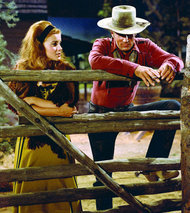
Twentieth Century Fox Home Entertainment
Mr. Cord with Ann-Margret, his romantic partner in the film.
On one hand, it was a fabulous break for an unknown actor with only one major role (in Richard Quine’s “Synanon”) to his credit…. Read More


Stagecoach (1966)
The full movie of “Stagecoach” is now available on YouTube! This movie was one of the first big motion pictures Alex Cord made. The original was a classic movie starring John Wayne and Alex starred in the first remake. “Stagecoach” had an all-star cast including Bing Crosby, Red Buttons and many more!


May 11, 2014
The Name Is Tim… Tim Flanagan: An Intervew With England’s Newest Hitmaker
Tim Flanagan is well known to many readers as the creator of “The Moon Stealers” series of books. Recently, however, he has been using his talents to put together a series of books aimed at helping newbie writers become versed with the writing world. These books entitled “From Feet To Fiction” have been taking the book world by storm. This interview with Tim was recorded live and shows the personality and talents of a bestseller whom you may want to learn from.
The Man:
1. Night owl or early bird?
Neither really – I’m an every day kinda guy. I’m awake as soon as my alarm goes off in the morning. I don’t tend to linger or pretend that I didn’t hear the alarm. Once I’m awake I like to get going with the day. I hate feeling like I’ve wasted a day – there’s always so much to do. Sometimes, if I need to put in more time when I’m editing or finishing off a book, I need to stay up late to work on it – there’s an enormous sense of satisfaction when I do that, like progress has been made. But, generally, I have to make the most of every opportunity I get to write. Life is filled up with normal “life” stuff. I need to work my writing around my family.
2. Other creative outlets?
As well as writing, I like to read, but I guess that doesn’t really count – it’s still work related. I have a graphics tablet and would love to get more time to do artwork. I enjoy cooking – that’s creative and you get to eat it afterwards, what could be better! There’s one more thing – it’s a dirty secret, but you won’t tell anyone will you? I secretly enjoy building LEGO with my children and would love to go into a LEGO store and buy some of the really big sets for myself and enjoy placing each individual brick myself.
3. Things that make you want to go “EEEEEEK!”
I’m not a fan of spiders and I don’t really like going up ladders much either, but both of them I have to do to maintain my incredibly credibility within my family. I would never make an audible “eeeeek” sound, I’m far too macho for that! But inside I might shudder and secretly hope my wife might offer to take the spider outside.
4. Favorite books from childhood.
When I was a child I enjoyed reading the Famous Five and Nancy Drew books, but the ones I seemed to have a bit of an obsession about were the Agatha Christie books. They were reissued when I was young with some lovely nostalgic art deco covers which I really liked. I still have those books on the top shelf of my book case. The pages have gone slightly orange with age and they have a particular “rusty” smell, but I like picking one up every now and then. My favourite of Christie’s books was “And then there were none.” It’s a clever series of murders that creates paranoia and fear amongst the characters. And, when there is only one left who must surely be the murderer, it’s not!
5. Three favorite movies:
It’s a wonderful life – I always cry when I watch it and it makes me realise how you should always appreciate your life. It restores my faith in human beings.
Harry Potter films – not any particular one, but the entire series. I like the way the characters grow with each film and how JK Rowling progressed the overall story bit by bit.
Lord of the Rings Trilogy – again, all three films are masterpieces in imagination and vision.
6. Who do you message most on Facebook?
Nick Wale, PR guru and fountain of all trivial information!
The Written Word:
8. Favorite type of hero (Type A bad boy or Type B good guy) Examples. (Which would you rather live with?)
A good guy with flaws. They are far more interesting and would have something interesting to say.
9. What type of fiction heroine would you be?Jane Eyre or Lara Croft?
Interesting question for a guy to answer!? I prefer Elizabeth Bennett from Pride and Prejudice – her wit and sharp responses during conversation are brilliant. She would be great to have round for dinner.
10. Favorite genre to read? (Is it what you write?)
I read a variety of genres, it depends how I feel at the time. The main two genres I’m currently enjoying are fantasy (George RR Martin) and historical crime (Philip Kerr and CJ Sansom). I have just read what I’ve written and I suppose these are the genres I write in – The Moon Stealer series is a sci-fi/fantasy series, whilst the Lawrence Pinkley Mysteries are crime (with a humorous edge!) My next series of books will also be fantasy but set in London in the present day.
11. What are you reading right now?
Harry Potter and the Goblet of Fire. After a trip to the Harry Potter film studios in London a couple of months ago, I decided to reread the series from the beginning and I’m really enjoying them. There is so much more information in them than couldn’t possibly be shown in the films.
12. Paperback or e-book?
On the whole I always read paperbacks. But, if I’m reading something that is educational or informative, I generally download the e-book to my android and read it during lunch breaks or whenever I have 5 minutes. E-books are so convenient and I must admit that I’m amazed by them. They are definitely the way forward.
13. Favorite books you can read over and over.
The Meaning of Night by Michael Cox – my all-time favourite.
A Writer’s Life:
14. OCD plotter or free range pantser?
Bit of both. I have an overall idea of my story but it always changes as I go along. Sometimes, whilst researching something, I might come across something that would be a crime to omit but it sometimes takes it in a totally different direction. I know what my end goal is, but not always how I’m going to get there. But, after examining the structure of other books, I have decided to try planning my next series of books to see if it works better. With that in mind I have started writing down notes and a more detailed plot, even though I’m desperate to start writing! I’ve told myself not to start until I have thought of all of the aspects and plots for all three books, but I’m not sure I will be able to survive – I might have to start writing soon.
15. Which was easier to get, agent or editor?
I don’t have an agent, so my answer would be an editor.
16. Do you have a set writing schedule?
I have a “real world” job so I have to fit my writing around that. I’m lucky that I recently reduced the number of days I work to just 3.5 days a week, so I get 1.5 days to sit in peace and quiet at home when the kids are at school and get some writing done. When they’re at home and there’s more noise around, I tend to sort out other aspects of writing like keeping up to date with social media, emails etc. There’s always something to do. I like to get two books a year out, that way readers will never have too long to wait until the next one. When I’m focussed I can write pretty quick.
17. Solo muse or critique partner(s)?
I don’t write for anyone in particular but my son is always a great sounding board for ideas. When I’m driving him to school I ask him what he thinks about a particular situation or the progress of a story. He is honest, but if he’s trying to be tactful, I can tell by the tone of his voice what his true feelings are about things. As my general audience are teens and young adults, it’s important for me to know what that age group likes to read.
18. Biggest hurdle to getting words on the page and how you overcome it.
Time. I would love to have more time to write but life gets in the way sometimes. I don’t begrudge all the other things, because your brain needs time to switch off or focus on something else. And, there are always bills to be paid, so until my books bring enough income to cover the bills, I have to mix the two. I don’t suffer from writers block. As soon as I sit down at the computer I can pick up where I left immediately.
19. What’s on your desk?
Apart from the usual things – laptop, mouse and printer, there is also my notepad and pen, The Sheep of Destiny key fob that a friend gave me, a picture of Charles Darwin, an assortment of photos of the children and items they have made, a paper mache heart, a stone with some stickers on, my name written by a Tibetan Monk, a silver nugget with the word love written in Egyptian Hieroglyphics. Oh yes – a pair of fingerless red gloves – it gets cold typing in the winter sometimes!
20. When can we get your next book and what’s it all about?
The Moon Stealer series is getting relaunched later in the summer – it is having some amazing artwork done for the front covers and will contain maps as well. At the same time an omnibus edition will also be released containing all four books.
At the end of the year the second Lawrence Pinkley mystery will be available – The Mystery of Van Gogh’s missing Heart. I’ve finished writing it, so it’s now with the illustrator for him to do his magic. There will also be a collection of short stories featuring Lawrence Pinkley coming out around the same time – they have also been written.
The next project will be the first in a trilogy about Ninjas in London. Should be great fun!




